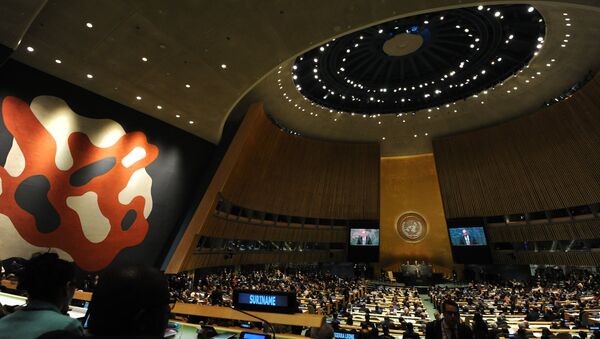Syria
Syrian Foreign Minister Walid al-Moallem took a hard stance Saturday, claiming that the recently-created committee tasked with writing Syria’s new constitution must not be limited by deadlines and must be run entirely by Syria alone, without interference from third parties.
"The committee must be independent. Its recommendations must be made independently, without interference from any country or party," al-Moallem said.
The committee is scheduled to have its first meeting on 30 October this year in Geneva.
He also blasted the US and Turkey for maintaining a military presence in Syria and called for the immediate withdrawal of foreign forces, warning that the Syrian government has the right to take countermeasures if they refuse.
The United States has around 1,000 troops stationed in Syria tackling Daesh militants, according to Reuters. Turkey has also launched military operation in Syria’s north, targeting Daesh and Kurdish YPG fighters.
Cuba
Cuban Foreign Minister Bruno Rodriguez Parrilla lashed out at the US for imposing a travel ban on the nation’s 88 year-old former leader Raul Castro and his immediate family. Castro is no longer the Cuban president but remains the leader of the Cuban Communist Party.
"This is an action that is devoid of any practical effect and is aimed at offending Cuba's dignity and the sentiments of our people," Parrilla claimed. "It is a vote-catching crumb being tossed to the Cuban American extreme right."
Parrilla accused the US of imposing an economic blockade on Cuba and criticized capitalist countries for harming the global ecological balance with its “irrational and unsustainable production and consumption patterns."
Yemen
The governemnt-in-exile of Yemen's new foreign minister, Mohammed Abdullah al-Hadrami, lashed out at Iran, which he called “the main sponsor of terrorism throughout the world” and scolded Tehran for what he called an “Iranian-Houthi coup d'etat.”
He stated that a new Yemeni government would "end any attempt to tear apart our homeland."
Al-Hadrami also accused the United Arab Emirates for airstrikes in the country’s south, saying they “undermined the stability of our homeland” and added that UAE’s interference voids the Saudi-led coalition’s attempts to assist the Riyadh-supported Yemeni. He thanked Riyadh for its support in a fight against the armed Houthi political opposition faction who he claimed were “dreaming of a theocracy."
Vatican
Cardinal Pietro Parolin, the Secretary of State of the Holy See, urged the international community to give special attention to the conflicts in Syria and Yemen, which he called two of the world’s most urgent challenges, to "put an end to the suffering of so many people."
The Secretary of State also referred to Israeli-Palestinian conflict, dire economic and political situations in Venezuela and Nicaragua and called for preservation of Amazon forests, which are being ravaged by enormous wildfires.
Mexico
Mexico's Foreign Minister Marcelo Ebrard said that his country encourages “peaceful solutions to controversies,” which must be based on “non-intervention and people’s self determination.”
He advocated for continued dialogue between Venezuelan government and the opposition and condemned the “US blockade on Cuba and sanctions against (other) countries.”
Ebrard stated that Andres Manuel Lopez Obrador brought “not only a change of government but a change of regime,” and vowed that his government will work "intensely" to strengthen "multilateralism" throughout the world, rejecting the rampant unilateralism being enacted by “certain nations.”
South Africa
South African Minister of International Relations and Cooperation Dr. Naledi Pandor said that its government acts on a firm belief in multilateralism, which she views as “a global governance system that is fair, equitable and representative,” and underscored the importance of global disarmament.
She decried the demise of the Intermediate Range Nuclear Forces Treaty (INF) in August, adding that reports of disarmament progress are few and far between.
Pandor called on the international community to join forces in solving the Israeli-Palestinian conflict, arguing that the Palestinians have lived “under occupation for 70 years.”
“It will only be through the determined efforts of the UN family that freedom for the people of Palestine can be achieved,” she said, comparing the conflict to that in Western Sahara.
Philippines
The supporters of multilateralism were criticized by Teodoro Locsin Jr., the foreign minister of the Philippines, for leaving out the issue of migration.
"It is telling that advocates of multilateralism conveniently leave out issues of migration. Migration is as multilateral as it gets. Migration is the pervasive reality today,” he said. “Migrant labor raises great cities out of deserts, mans the ships that enable global trade. Migrant health workers care for the sick, the children, the elderly, giving to strangers as much care as they gave their own loved ones back home.”





